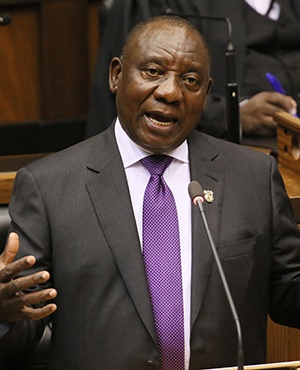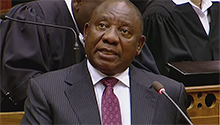Why expropriation without compensation is incompatible with economic growth
2018-02-22 07:28
President Cyril Ramaphosa delivers his inaugural State of the Nation Address. (Ruvan Boshoff, AFP)
Multimedia · User Galleries · News in Pictures Send us your pictures · Send us your stories
Terence Corrigan
In the debate on his State of the Nation Address (SONA), President Cyril Ramaphosa said: "We need to interrogate the statement that the expropriation of land without compensation is incompatible with a growing, flourishing economy."
This invitation is gladly accepted.
There is perhaps no better place to start than with the National Development Plan (NDP), with whose composition President Ramaphosa was closely involved. It identified agriculture as a potential growth area, and argued for the imperative of expediting land reform. No disputes there.
It also drew attention to the fact that large-scale investment will be necessary to make this happen. It stresses, for example, the need for new irrigation projects. This must be done so as to maintain efficiently functioning market mechanisms. "Investment by farmers," as the NDP notes, "will occur if they believe income streams are secure. This requires infrastructure and functioning market institutions, including insurance markets."
Elsewhere it calls for "a more rapid transfer of land to black beneficiaries without distorting land markets or business confidence in the agribusiness sector".
A regime of expropriation without compensation would do precisely what the NDP warns against. It would significantly ramp up the risks associated with agriculture. The prospect of being deprived of assets without compensation would be a major disincentive for investment – indeed, a standing concern for any involvement in agriculture.
Perhaps more importantly, it would be viewed with great concern by the financial sector. Commercial agriculture cannot operate without access to significant funding sources. This is necessary for both capital expenditure (such as that contemplated in the NDP) and for operational expenditure. Currently, farm debt exceeds R160 billion, a majority of which is held by commercial institutions.
The prospect of their client' collateral being seized would be a deterrent to banks' continued involvement in the agricultural sector. No less a figure than Cas Coovadia, managing director of the Banking Association of South Africa, cautioned last year that if this were to become policy, there was a strong likelihood that financial institutions would be reluctant to extend further finance.
It is hard to imagine that the government would be in a position to provide resources on a scale that would come close to making up for what a skittish banking sector would no longer be prepared to provide.
The result would be the decline of agricultural production. It is an outcome that would be entirely predictable.
Ironically, there is little evidence – not even from government's own investigations – that the need to pay compensation is undermining land reform. And by placing expropriation without compensation front and centre of efforts in this regard, the necessary adjustment to policy and implementation are likely to be deferred. This would only compound South Africa's current failures.
Finally, it is also important to understand that a move towards expropriation without compensation would throw a blanket of uncertainty over the very concept of property rights in South Africa. This would be equally true of all property holders, large and small, black and white. Having abridged property rights in order to expedite land reform, the scene could be set for intrusion into any number of other spheres. This would unsettle the economy well beyond agriculture.
Coovadia has commented: "I can't understand how you're going to expropriate land without compensation and still get investors in with confidence and get rating agencies to hold off on further downgrades."
In reality, these things are fundamentally incompatible.
- Terence Corrigan is a Policy Fellow at the Institute of Race Relations.
Disclaimer: News24 encourages freedom of speech and the expression of diverse views. The views of columnists published on News24 are therefore their own and do not necessarily represent the views of News24.



























